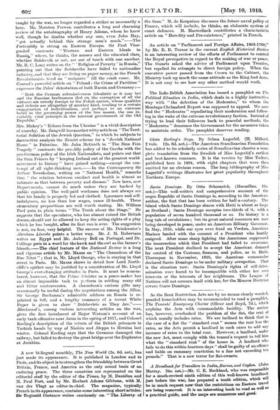SOME BOOKS OF THE WEEK.
INuliee is this alums don set iieceerrily preclude eubsequod THE MAY Moernmes.—There is a timely article in the Nine- teenth Century on "The Right to Idle," by Mr. J. A. R. Marriott, who recalls in some detail the story of Louis Blanc's " National Workshops" in 1848 to point the moral of an "unemployment donation" distributed to all and sundry by careless officials. We have often told the story in the Spectator, but we are glad to too it retold. In 1848 the French Provisional Government paid 1 franc 50 a day to the unemployed and 2 francs to those employed on national work ; consequently the workman thought that lie should do only 50 centimes' worth of work if he were employed. Mr. Marriott cites a recent case of a man who refused a post at 45s. a week on the ground that he should not be expected to work for 16s. a week—his assumption being that he was sure of receiving 29s. front the State while he was idle. In Paris nearly half the workmen joined the " National Workshops," where there was little or no work. When the Government decided to end the scandal, they had to face and suppress an insurrection ; in three days' fighting there were sixteen thousand casualties— the price of a vicious experiment in which economic law was defied. Lord Ailesbury, writing on " The Soldier and the Land," declares that " small holdings can only be made to pay by men of exceptional energy and exceptional brains." The farmer, he says, must have security of tenure, cheap transport, and a good market for his produce ; and the last condition, he gives us to understand, implies an import duty on foodstuffs. Bishop Frodsham, late of North Queensland, has an important article on "The British Empire and Japanese Racial Aspirations." He fears lest the League of Nations should bring to a crisis the difficulties which Great Britain and the Dominions have been gradually smoothing away. Australia, he says, is less concerned with the immigration of cheap Japanese labour than with the importation of the products of that cheap labour•. British Columbia, on the other• hand, finds the Japanese predominating in the fishing industry. Japan's Industrial Revolution will not last long, but for the time being the competition of her new industries is keenly felt in Australia. Sir Elliot Colvin discusses "The Changing Scene in India," pointing out that, while the moderate Nationalists arc so weak and unwise, the progress of reform must be checked. Professor Foster Watson writes on "The Classics and Democracy," aptly citing Hobbes, who de- nounced the classics primarily because they were democratic, and recalling the fact that the Puritans were the outcome of the new grammar schools. Miss Edith Sellers, inquiring " Among the Strikers Womenfolk," found that wives and mothers, taught by the war, no longer regarded a striker as necessarily a hero. Mr. Moreton Frewen contributes a long and charming review• of the autobiography of Henry Adams, whom he knew well, though he doubts whether any ono, even John Hay, " got actually behind this strange man's mask."—The Fortnightly is strong on Eastern Europe. Sir Paul Vino- graded contrasts "Western and Eastern Ideals in Russia," where, he thinks, the masses and the educated class, whether Bolshevik or not, are out of touch with one another. Mr. R. C. Long writes on the ' Religion of Poverty' in Russia," pointing out that the Bolsheviks have failed to nationalize industry, and that they are living on paper money, as the French Revolutionists lived on `• assignata " till the crash came. Mr. Conrad's powerful article on Poland : the Crime of Partition " expresses the Poles' detestation of both Russia and Germany:—
" Both the German submissiveness (idealistic as it may be) and the Russian lawlessness (fed on the corruption of all the virtues) are utterly foreign to the Polish nation, whose qualities and defects are altogether of another kind, tending to a certain exaggeration of individualism, and perhaps to an extreme belief in the governing power of the free assent, the one in- variably vital principle in the internal government of the Old Republic."
Mrs. Blakey's " Echoes from the Ukraine " is a vivid description of anarchy. Mr. Zangwill hasanother wittyarticleon The Terri- torial Solution of the Jewish Question," in which he subjects to destructive analysis the Zionist scheme for a "Jewish National Home " in Palestine. Mr. John McGrath in " The Sinn Fein Tragedy " contrasts the pro-Ally policy of the Czechs with the pro-German policy of the Irish Nationalists, and points out that the Sinn Feiners by " keeping Ireland out of the greatest world- movement in history " have gained nothing—except the con- tempt of all right-thinking men.—In the Contemporary Sir Arthur Newsholme, writing on " National Health," remarks that the relation between conduct and health is almost as intimate as that between poverty and disease." New laws, new Departments, cannot do much unless they are backed by public opinion. The well-paid workman does not always see that his family is properly fed and clothed. Ignorance and self- indulgence, no less than low wages, cause ill-health. These elementary propositions are well worth stating. Mr. William Poet puts in plain terms " The Truth about the Stage" He suggests that the speculator, who has almost ruined the British drama, should not be allowed to keep the acting rights of a play which he has bought, after its first run is over. The suggestion is not, we fear, very helpful. The success of Mr. Drinkwater's Abraham Lincoln points a better way. Mr. J. M. Robertson writes on Egypt and Mr. Aubrey Bell on Portugal, and Dr. Collinge puts in a word for the hawk and the owl as the farmer's friends.—The ohief feature of the National Review is a long and vigorous article by Mr. Masse on " The Chameleon of the Rue Nitot " ; that is, Mr. Lloyd George, who is staying in that street in Paris. Mr. Maxse shows in detail how Lord North- cliffe's epithet may be justified by a consideration of Mr. Lloyd George's ever-changing attitudes in Paris. It must be remem- bered, however, that the Prime Minister as a peace-maker has an almost impossible task to perform in settling many old and bitter controversies. A chameleon's curious gifts may occasionally be useful during the negotiations among the Allies. Sir George Buchanan's admirable address on Russia is re- printed in full, and a lengthy summary of a recent White Paper is given to show " Bolshevists as They Are."— Blackwood's, among various interesting articles on the war, gives the first instalment of Major Watson's account of an early tank offensive near Arras in the spring of 1917, and Colonel Keeling's description of the return of the British prisoners in Turkish hands by way of Nisibin and Aleppo to Mersina last winter. Colonel Keeling says that the Germans damaged the railway, but failed to destroy the great bridge over the Euphrates at Jerablus.







































 Previous page
Previous page